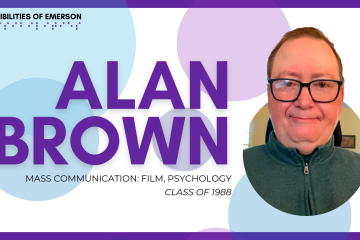
Jacqueline Holland ’04
Jacqueline Holland, 2004
Bio: Jaqi has worked at Emerson since 2000, managing the day-to-day operations of the WARC and connecting students to appropriate support. Jaqi also works in Student Accessibility Services arranging accommodations such as extended time testing for students with disabilities. She is a freelance copyeditor and was a journalist and professional tutor before coming to Emerson. She has a B.A. in Sociology from Assumption College and an M.A. in Writing and Publishing from Emerson College.
What are some of the ways Emerson has prepared you for the work you do today with students?:
When I started Emerson’s Writing and Publishing program in 2001, my end goal was to work in a small publishing house, editing manuscripts, which sounded dreamy. The courses gave me not only solid editing skills, but also people skills—how to work in a team, how to communicate well, and how to edit with kindness. In the meantime, I was working at Emerson’s Writing and Academic Resource Center, connecting students with resources and working in Student Accessibility Services arranging academic accommodations for students with disabilities. Turns out I loved working with students more than publishing and here I am 17 years later. The skills I learned in the program might not seem instantly transferable, but they really were. I use them both in working with students and also in my freelance copyediting work: kindness and attention to detail matter.
Students often struggle to find their writing voice as they pursue their degrees here. What advice do you find yourself providing the most?:
Your writing voice is one aspect of writing that’s truly yours. Own it. Don’t try to sound like someone else. Be you. Remember when you tried to elevate your voice back in your first-year composition class, thinking that formal academic tone made it sound like you knew what you were talking about? It didn’t. I know because I tried that tactic too! Better to be authentic and use your natural voice.
What does representation for womxn mean for you in the writing community?:
Women’s voices—all women’s voices—need to be heard. That means if you’re writing, you should also be submitting. People need to hear your stories whether they identify with them, are comforted by them, or disagree with them. Literary journals, news outlets, and websites from mainstream to niche all want your stories.
Well, not every story; get comfortable with rejection and don’t take it personally; every great writer has been rejected. But we are a culture based on storytelling and who better than you to tell them?
Many Emerson students are currently pursuing or are interested in pursuing freelance work. As someone who does freelance copyediting, what advice might you give them?:
Freelance work is a viable side hustle as many young professionals need to piece together several gigs to make ends meet. Be professional: get a website—it doesn’t have to be fancy—and business cards to start, but most of all, let people know what you do. Practice your elevator pitch. Being active in professional organizations and on social media are important strategies, but all my clients have come from word of mouth, so don’t forget the human connection. I’ve discovered clients from Meetup groups to failed dates!
Who are some of your favorite womxn authors that you wish everyone would read?:
I’m a huge fan of Ann Patchett, Jhumpa Lahiri, Elizabeth Gilbert, and Jesmyn Ward who all navigate both fiction and nonfiction seamlessly; Susan Orlean who writes compelling profiles of people you’ve never heard of; poets Mary Oliver and Marie Howe, keen observers of nature and the human condition; and journalist Rebecca Traister who writes a lot about the growing single women demographic.
As we see a well-needed push for womxn to pursue careers in STEM, how do you think we can advocate for the impact of written communication across industries?:
Strong writing skills are key to success in any discipline. Even if writing is not the focus of your career, crafting a succinct email can serve you well in any field. You might be a superstar in the lab, but at some point, you have to share your findings, and how you present your project might be the key to getting more research money. If nothing else, communicating effectively will serve you well in advocating for a promotion or writing a stellar self-evaluation when it comes time for your annual review. Social media is everything and you don’t want to be the person who sends out a grammatically confusing tweet. As educators, we need to continue to show students why writing matters in virtually every job and in life.


